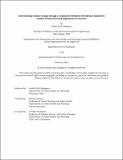Understanding Climate Change through a Community Definition of Resilience: Qualitative Analysis of Interviews and Implications for Practice
Author(s)
Nakagawa, Anisha Patil
DownloadThesis PDF (1.437Mb)
Advisor
Arcaya, Mariana
Binet, Andrew
Terms of use
Metadata
Show full item recordAbstract
This thesis explores how residents in low-income, rapidly gentrifying neighborhoods conceptualize resilience to climate change and what responses are desired. As part of a Participatory Action Research study in Eastern Massachusetts, I analyzed de-identified interviews with residents and engaged in collaborative data analysis sessions with Resident Researchers. Residents in these communities experience climate change through chronic stressors, mainly through heat, high utility bills, and flooding. They connect climate resilience to other stressors in their lives like displacement, structural racism, and trauma, and they see strong community ties as a key piece of resilience. Based on this research, responses to climate change need to consider the root causes of unjust systems, respond to the co-stressors in people’s lives, and have community ownership and control in order to be most effective.
Date issued
2024-02Department
Massachusetts Institute of Technology. Department of Urban Studies and PlanningPublisher
Massachusetts Institute of Technology